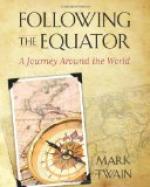Yesterday a lunatic burst into my quarters and warned me that the Jesuits were going to “cook” (poison) me in my food, or kill me on the stage at night. He said a mysterious sign was visible upon my posters and meant my death. He said he saved Rev. Mr. Haweis’s life by warning him that there were three men on his platform who would kill him if he took his eyes off them for a moment during his lecture. The same men were in my audience last night, but they saw that he was there. “Will they be there again to-night?” He hesitated; then said no, he thought they would rather take a rest and chance the poison. This lunatic has no delicacy. But he was not uninteresting. He told me a lot of things. He said he had “saved so many lecturers in twenty years, that they put him in the asylum.” I think he has less refinement than any lunatic I have met.
December 8. A couple of curious war-monuments here at Wanganui. One is in honor of white men “who fell in defence of law and order against fanaticism and barbarism.” Fanaticism. We Americans are English in blood, English in speech, English in religion, English in the essentials of our governmental system, English in the essentials of our civilization; and so, let us hope, for the honor of the blend, for the honor of the blood, for the honor of the race, that that word got there through lack of heedfulness, and will not be suffered to remain. If you carve it at Thermopylae, or where Winkelried died, or upon Bunker Hill monument, and read it again “who fell in defence of law and order against fanaticism” you will perceive what the word means, and how mischosen it is. Patriotism is Patriotism. Calling it Fanaticism cannot degrade it; nothing can degrade it. Even though it be a political mistake, and a thousand times a political mistake, that does not affect it; it is honorable always honorable, always noble—and privileged to hold its head up and look the nations in the face. It is right to praise these brave white men who fell in the Maori war—they deserve it; but the presence of that word detracts from the dignity of their cause and their deeds, and makes them appear to have spilt their blood in a conflict with ignoble men, men not worthy of that costly sacrifice. But the men were worthy. It was no shame to fight them. They fought for their homes, they fought for their country; they bravely fought and bravely fell; and it would take nothing from the honor of the brave Englishmen who lie under the monument, but add to it, to say that they died in defense of English laws and English homes against men worthy of the sacrifice—the Maori patriots.
The other monument cannot be rectified. Except with dynamite. It is a mistake all through, and a strangely thoughtless one. It is a monument erected by white men to Maoris who fell fighting with the whites and against their own people, in the Maori war. “Sacred to the memory of the brave men who fell on the 14th of May, 1864,” etc. On one side are the names of about twenty Maoris. It is not a fancy of mine; the monument exists. I saw it. It is an object-lesson to the rising generation. It invites to treachery, disloyalty, unpatriotism. Its lesson, in frank terms is, “Desert your flag, slay your people, burn their homes, shame your nationality—we honor such.”




